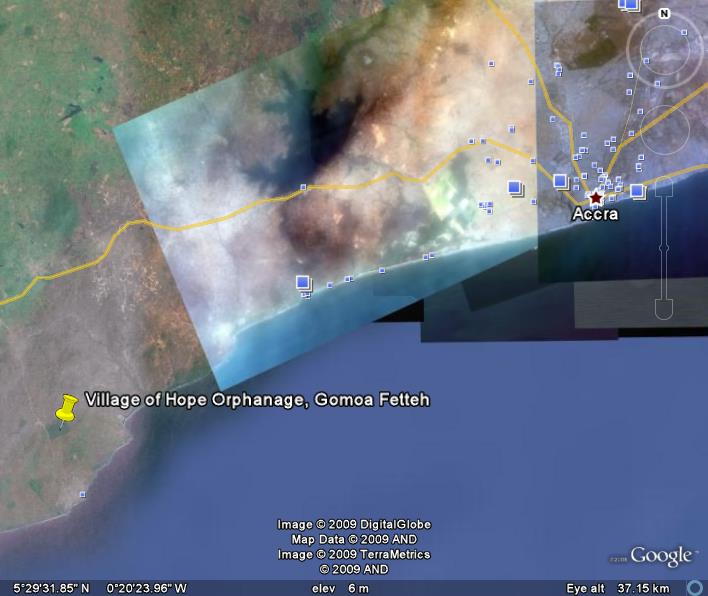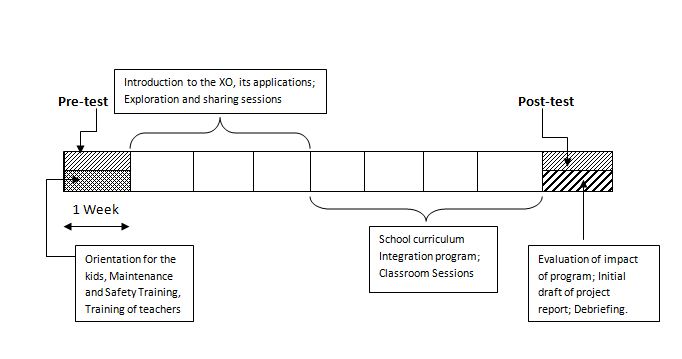Ashesi University, Ghana
Project Overview
Goals
• To provide an alternative learning tool for disadvantaged children at an orphanage in rural Southern Ghana.
• To facilitate the involvement of these children in information technology, thus opening them up to new educational opportunities.
• To equip the children in such a way as to enable them productively learn and interact with their laptops independently, and to encourage the children to collaborate, teach and learn from each other.
• To successfully provide a model for larger-scale deployment and training. The project might also provide a model for other NGO-supported orphanages to see the benefits of OLPC laptops to their students, and so might instigate a larger-scale deployment of laptops at private and other NGO-supported schools.
Sustainability
• Strong working relationship with managing staff at the orphanage.
• The Village of Hope is on a list of agencies where Ashesi University students perform community service yearly. This means that every year, the project will receive continued support from college volunteers in terms of training, troubleshooting, servicing, fundraising and development of educational content.
• Long-term commitment from the management to the support of innovative educational programs.
• The operations manager at the orphanage is a Computer Science graduate from Ashesi University. She is qualified to maintain and service the server herself, and will work to maintain working ties with the group, Ashesi and the orphanage.
• Close proximity of the orphanage to the group, Ashesi University and the Accra metropolis,(22 miles from Accra, 80-minute drive)

Specifics
Target Institution: Village of Hope Orphanage, Ghana
Location: Gomoa-Fetteh, Southern Ghana
Local NGO Partner: Ghana West Africa Missions.
Advisors: Dr. Suzanne Buchele, The Baah-Wiredu One Laptop per Child Foundation
Team Members
| Name | Group position | Competencies & Experience |
|---|---|---|
| Nii Ayertei Tettey | Pedagogical and Creative Lead | 2 years experience in charity and NGO work, prior teaching and mentoring experience at an orphanage; Business Administration major |
| Romeo Owusu-Aning | Project Manager | Co-author, Research paper:“The One Laptop Per Child (OLPC) Project and Its Applicability to Ghana” , volunteer for Ghana OLPC Pilot Project; Management Information Systems major |
| Hanan Yaro Boforo | Technical Support Staff | Volunteer work: Guinea Worm sensitization in northern rural Ghana; Teaching and helping transform delinquent juveniles at a remand centre in Accra ; Computer Science major |
| Solomon Kwashie Kofigah | Accounts manager | Volunteer program work at the Accra Psychiatric Hospital; Management Information Systems major |
| Joseph Ofori Amegatcher | Technical Lead | Volunteer work: Math teacher at Vocational School and ‘big brother’ at a remand centre
Computer Science major |
Project Proposal
The project is estimated to be over a 9-week period, starting in late May and ending late July, coinciding with our summer break and part of the vacation period for the kids at the Village of Hope. To measure the effect of the program on the children’s regular school learning, a pre-test and post-test are scheduled to be done in the first and ninth weeks of the project. This is separate from the evaluation of the project to measure the overall level of success and its suitability as a model for other private and NGO-supported orphanages and schools. To evaluate the impact of the training, Kirkpatrick’s 4-level training model will be used. This is because particularly important to us is the children’s ability to share what they have learnt with their contemporaries (level 3).
Orientation.
Focus: Child Ownership, Low Ages
During the first week, an orientation program will be organized to introduce the kids to the concept of the XO, the essentials of the training program, how to take care of their laptops, safety issues etc. For the teachers who we will be working with, a similar orientation will be organized on the education principles of OLPC and maintenance and safety issues.
Introduction to the XO
Focus: Low Ages, Connection
The second part of the program, which spans 3 weeks, is meant to introduce the children to the actual usage of the XO, its applications, to encourage spontaneous use and sharing by the children. This will be in 4 broad sections:
1. Introduction to XO applications
2. Fun with the XO
3. Communications and server interaction
4. Tools for self learning: Spontaneous exploration and sharing
Curricular Integration
Focus: Sustainability
The third part of the program, spanning 4 weeks, is designed to coincide with the reopening of school. Here, team members will collaborate with teachers in classroom sessions to teach the children how they can use the laptop for their regular schoolwork and as an alternative learning resource.
Evaluation and Post-test
Focus: Sustainability, Evaluation, Saturation
In the final week, the program will be evaluated by examining what effect the training had on the children’s learning habits. This is in two parts; taking a post-test to see how the children’s learning has improved, and evaluating the children’s understanding to know the effectiveness of our teaching methods and program design. During this week also, work will begin on a report meant to assess the project and identify how best the model can be deployed in other locations.
Team members are well-motivated, ready and eager to commence the project.
Budget
Deployment Costs
| Item | Details | Weekly Cost | Total Cost(Over 10 Weeks) |
|---|---|---|---|
| Food and Water costs | $5 per day per team member (5 total) | $175 | $1575 |
| Transportation | Mileage rate: $0.63 per mile
Assuming round trips between Accra (home base) and the deployment site 3 times a week, Weekly transport cost: (21.6 miles × 2 passes) × 3 times a week × $0.63 = $81.66 |
$81.66 | $816.66 |
| Accommodation | Negotiated rate for nearby rented cabin for 10 weeks. | - | $500 |
| Other miscellaneous expenses | Cost of local errands, airtime, replacing damages etc. | - | $200 |
| Total | $3091.66 |
Kigali Trip Costs
| Item | Details | Unit Cost | Group members | Total |
|---|---|---|---|---|
| Air ticket | Kenya Airways, Economy Round ticket: Accra – Kigali – Accra | $1085 | 3 | $3255 |
| Visa fee | $100 | 3 | $300 | |
| Miscellaneous air travel costs | Airport tax, baggage charges, Taxi fares etc | $75 | 3 | $225 |
| Total | $1260 | $3780 |
Equipment Purchase and Installation Costs
| Item | Details | Unit Cost | Quantity | Total Cost |
|---|---|---|---|---|
| Secure storage Facility for the Laptops | (Cost of purchasing 2 Wooden, locally manufactured sideboards; Inclusive of purchase of locks and Cabinetry Fee) | $30 | 2 | $100 |
| Uninterrupted Power Supply Systems/ Power Stabilizers | $100 | 3 | $300 | |
| Power Strips | $8 | 50 | $40 | |
| Electrical Upgrades | $500 | - | $500 | |
| Wireless Access Point Routers | $100 | 2 | $200 | |
| Miscellaneous Equipment Purchase | Batteries, cables, adapters etc | - | - | $10 |
| Hardware Setup Kits | $13 | 2 | $26 | |
| Total | $1176 |
Total budgeted expenditure = $1176 + $3091 + $3780 = $8047
